Fire retardant protection for wood

Wood is a practical, durable and environmentally friendly material of natural origin, usually used in low-rise construction, decoration and renovation work. Experts attribute high flammability and vulnerability to biological effects (activity of wood-destroying microorganisms and insect pests) as its significant disadvantages. To enhance the fire and biological resistance of wood, experts use special compounds and concentrates in its processing. How do such tools work? How to choose a suitable fire protection and how to use it?



What it is?
Fire retardant protection for wood is a group of special products based on water, oil or alcohol, used for processing wooden structures. The main purpose of these drugs is to increase the fire resistance of wood and to protect it from various sources of biological effects: microorganisms, insect pests.

Fire retardant products include fire retardants and antiseptics. Fire retardants containing flame retardants (boron and ammonium phosphates, ammonium chloride) slow down the rate of ignition and spread of fire. Antiseptics, in turn, protect the tree from sources of biological damage: pathogenic microorganisms (fungi and bacteria) and insect pests (grinder beetles).
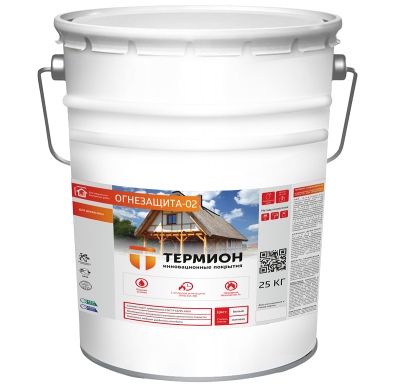
The period of validity of fire-biological protection, depending on the characteristics of its composition, can vary from 5 to 25 years. After the expiration of the period of validity of the fire-biological protection, the processing of the tree is repeated. It should be noted that the period of validity of bioprotective agents can significantly reduce the following factors:
- mechanical damage to wood (cracks, chips, deep scratches);
- prolonged exposure to low temperatures (freezing of a tree);
- high air humidity, causing dampness of the tree.
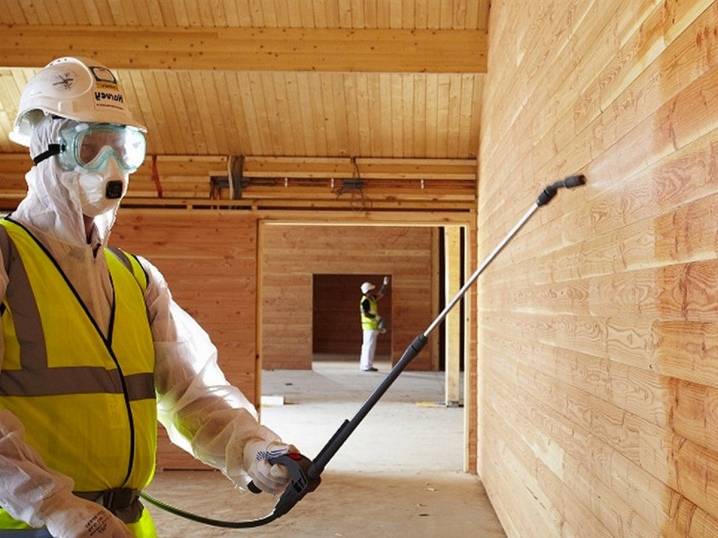
Fire protection is recommended for processing wooden objects of any configuration - from ordinary cabins and sheds made of boards to low-rise residential and non-residential buildings (baths, saunas, gazebos, verandas).
How does it work?
In the course of processing, fire-retardant agents are applied to the surfaces of all elements of a wooden structure, or they are impregnated with the compounds used. Complex products containing fire retardants, fungicides and antiseptics are applied once. If fire retardants and antiseptics are used separately, they are applied sequentially one after the other.
It should be noted that fire retardants do not make the wood completely non-combustible. Their main purpose is to slow down the ignition process and the further spread of fire.
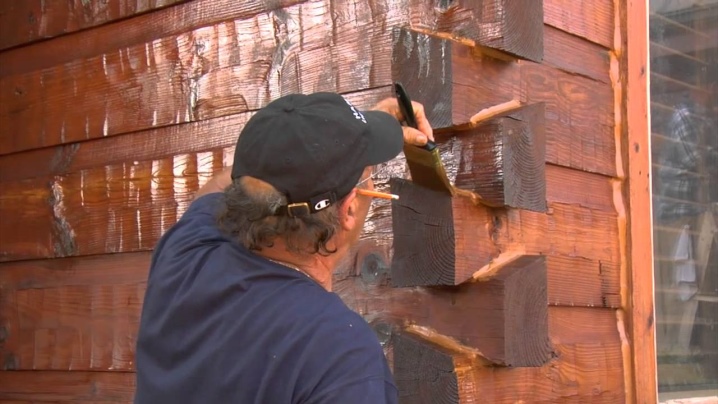
The mechanism of action of fire retardants is as follows:
- under the influence of a flame, the active components of fire retardants begin to emit sulfurous or ammonia gases, which reduce the concentration of oxygen in the air, thereby preventing combustion;
- a number of non-combustible components in the composition of fire retardants after treatment fills micro-voids in the wood structure, reducing the potential area of fire;
- a number of components with low thermal conductivity, after the application of fire retardants, forms a film on the surface of the wood that prevents ignition and the spread of fire.

Besides, after treatment with fire retardants, a special protective layer forms on the surface of the wood. Under the influence of a flame, it swells up, preventing the fire from directly contacting the wood. Thus, due to all of the above properties of fire retardants, the speed of flame propagation in the event of a fire is significantly reduced, which provides a person with the opportunity to urgently take all the necessary measures to prevent a fire.
Antiseptics and fungicides are another important component of bio-fire protection. These components provide bio-protection of wooden structures, suppressing the activity of pathogenic microorganisms (fungi and bacteria) that destroy the structure of the tree. In addition, after treatment with antiseptics and fungicides, the wood ceases to attract the attention of pests (grinder beetles).

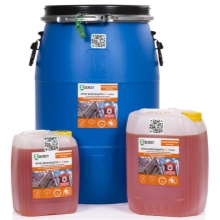

Views
Modern manufacturers offer a wide range of bioprotective agents that differ in composition, method of use, and degree of effectiveness. Depending on the place of application, the offered products are divided:
- for fire protection for external processing of objects;
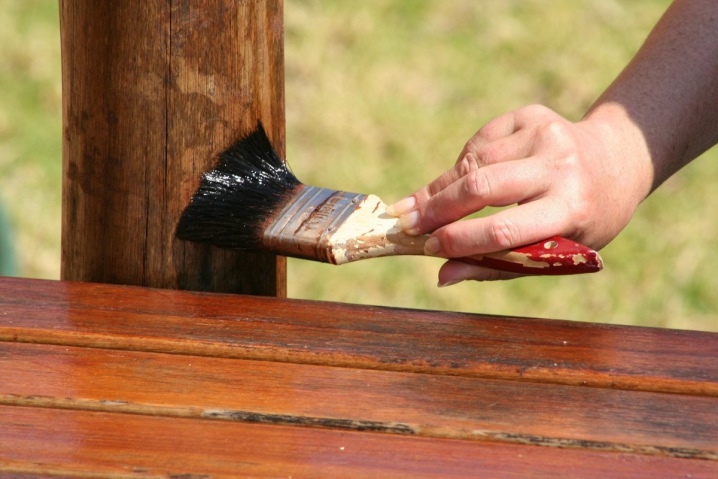
- fire protection for processing objects inside (for interior decoration).
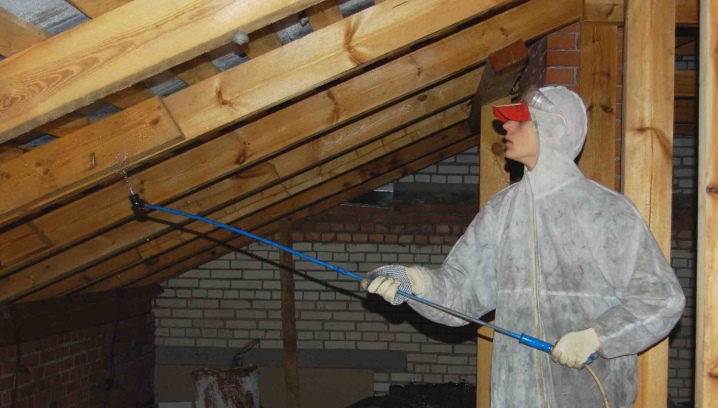
Depending on the composition, the considered funds are divided into saline and non-saline. Salt preparations are based on salts of various acids. Means of this category are easily washed out with water, therefore they provide fire-resistance of objects for a short period - only up to 3-5 years, after which the processing of structures is repeated. At the same time, the stable demand for this type of bio-fire protection is due to its low cost. The main purpose of this group of products is the internal processing of wooden structures.
The basis of non-salt products is organophosphorus. Funds of this category are not washed out by water, provide reliable and durable fire-retardant protection of structures for a period of 10-15 years.

Depending on the degree of fire retardant efficiency (EE), fire retardant compositions are divided into 2 groups. Means belonging to group 1 make wood hard to burn, capable of resisting open fire for a long time with minimal damage. Means of the 2nd group make the tree hardly flammable.


Depending on the method of use, fire-retardant preparations are divided into impregnations and coatings. Both those and other means have their own advantages and disadvantages.
Impregnations
Means of this category are intended for deep processing (impregnation) of wood. They retain the original appearance and color of the tree, provide its reliable fire-retardant protection, do not require the use of special equipment. Depending on the base, it is customary to distinguish between water, alcohol and oil impregnations.
It should be noted that impregnations are usually more expensive than coatings.
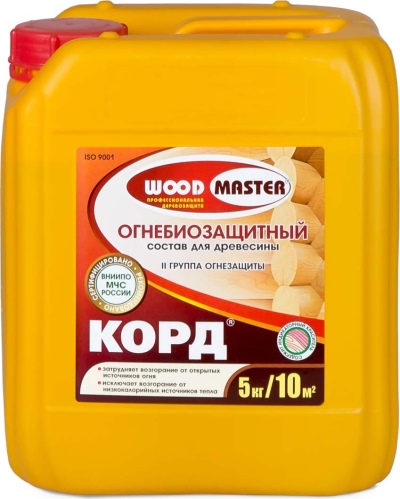
Paints and varnishes
Designed for surface treatment of wood. They are easy to apply and dry quickly. At the same time, they do not provide a high fire resistance of wood, they have a pungent specific odor. Besides, opaque coatings radically change the appearance and color of wood, tint its surface.

Top manufacturers
In the modern market of materials for construction, repair and decoration, various types of fire-retardant compositions, both domestic and foreign, are presented. The offered products differ both in price and in their performance characteristics. Below is a rating of manufacturers whose products are most popular with consumers.
- NEOMID ("Neomid") - a well-known brand belonging to the domestic manufacturer EXPERTECOLOGIA-NEOCHIM Group of Companies, under which high-quality products for construction, repair and finishing works are produced. The range of products includes a wide selection of fire retardant agents in the form of impregnations and paints of the 1st and 2nd categories of fire retardant efficiency.Some of the best fire retardant agents, according to users, are NEOMID 450 (impregnation) and NEOMID 040 Professional (paint).


- "Senezh-preparations" - one of the leading domestic manufacturers specializing in the manufacture of various protective equipment for wooden structures and structures. The Senezh-preparations range of products includes a line of antiseptic concentrates and fire-retardant agents for wood processing. Firebio protection of this brand is represented by two products - "Senezh Ognebio" and "Senezh Ognebio Prof". The first agent is a transparent impregnation that protects the wood from fire and flame spread (validity period - 3 years). The second agent is a red impregnating fire-retardant composition, which has a validity period of 5 years. Both products reliably protect wood from rotting, mold, damage from beetles-grinders.
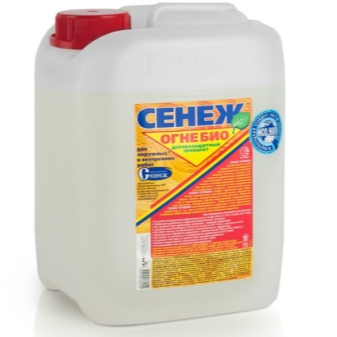

- "North" Is another well-known domestic manufacturer of fire-retardant, antiseptic and decorative-protective compounds and paints and varnishes. The company produces a range of fire-retardant bio-protective products called "Biopiren" and "Biopiren Pirilax", intended for external and internal processing of wooden structures and structures. These funds, according to the manufacturer, provide wood biosecurity for 20-25 years, fire protection - for 3-5 years.

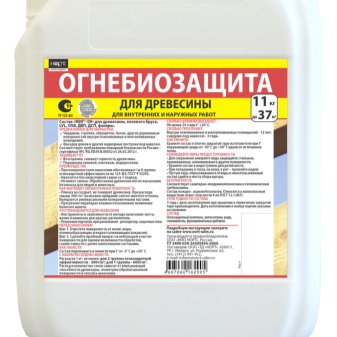
- "Rogneda" - a large domestic company specializing in the production of various materials for construction and repair. The company produces a series of Woodstock products that provide reliable fire protection for wooden structures. The series includes both impregnating solutions and paints and varnishes. It is noteworthy that this manufacturer has its own production complex, which produces fire-retardant products and checks them for compliance with established standards.


How to choose?
When choosing bioprotection, it is necessary to take into account the features of the design requiring processing, the conditions of its operation, as well as the characteristics of the purchased product. The most significant are:
- availability of a certificate
- fire retardant efficiency group;
- composition;
- consumption of funds per 1 m2 of area;
- absorption depth;
- method of application;
- shelf life.

A high-quality fire retardant agent necessarily has a certificate confirming its compliance with established standards. The highest degree of fire-biological protection is provided by means belonging to the 1st group of fire-retardant efficiency. They should be used for processing wooden residential buildings.
For external and internal processing of buildings, experts recommend purchasing non-salt products on an organophosphate basis. Salt products should be purchased only for internal processing of wooden structures.
When buying bio-fire protection, you should pay attention to the consumption rates of the product, which can vary from 100 g / m2 to 600 g / m2. It must be borne in mind that the higher the consumption of funds, the more expensive the processing of the structure will be.

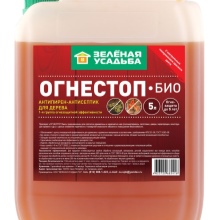

Depending on the depth of absorption, it is customary to distinguish between surface agents (the depth of penetration into wood is 5-6 mm) and deep penetration agents (more than 10 mm). The second category of drugs provides longer-term fire-retardant protection of wooden structures, therefore it is recommended to purchase them for capital processing of elements of residential buildings. At the same time, according to most consumers, wood treatment with surface products is much cheaper and much faster.

Also, when choosing fire-biological protection, you should pay attention to the method of its application. Most of the products offered by modern manufacturers are applied to the wood with a roller or brush. However, some types of tools may require the use of special equipment.Another group of fire-retardant agents is used in the form of solutions, in which it is envisaged to soak wooden structures (when they are completely immersed in a solution) for a certain time.
Another important nuance that should be considered when choosing fire protection is its color. Colorless fire protection allows you to preserve the natural color of the wood. Colored products, in turn, modify the wood, giving it a certain shade.

How to use?
Before applying fire protection with your own hands, you must carefully read the attached instructions. All means of this kind must be used only in relation to dry wood (the permissible moisture threshold is no more than 30%).
Applying fire-retardant protection is allowed only in warm, dry weather. At subzero air temperatures and high humidity, these products cannot be used for their intended purpose.
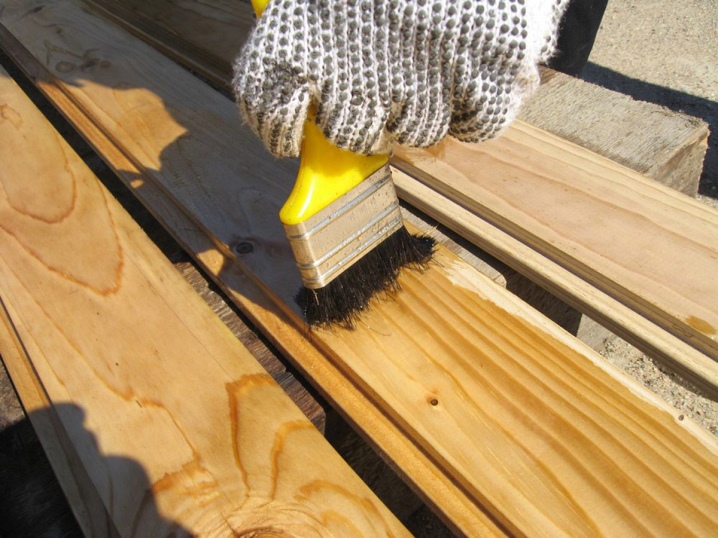
The sequence of processing wooden structures under favorable weather and temperature conditions is as follows:
- after planing and sanding, the wood surface is cleaned of debris, sawdust, dust and other contaminants;
- dry the structure thoroughly;
- prepare the necessary list of tools and containers (rollers, brushes or brushes, a container for a fire-retardant solution);
- apply varnish or impregnation with a brush or roller in several layers (their number is determined in accordance with the instructions).

It is important to note that in the intervals between the application of layers, it is necessary to maintain a temporary pause, waiting for the product to dry. Each subsequent layer should be applied only to a dried surface. At the end of the work, a kind of film should form on the surface of the tree, which will further protect the structure from fire, mold formation and the activity of pests.














The comment was sent successfully.